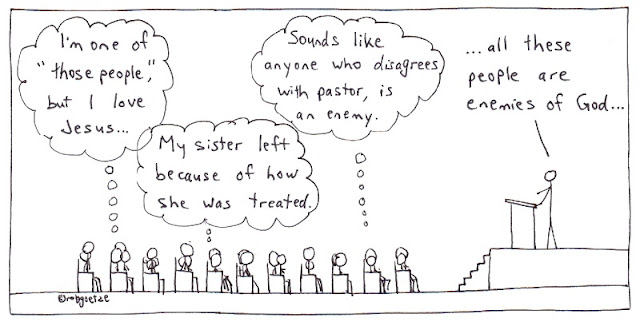Can we agree to major on the majors? Can we focus on what really matters to the kingdom, and agree to disagree on the secondary things?
How easily we get distracted from what matters to the Kingdom of God. And surely quantity of water cannot be one of them. In this cartoon, pastor lumps the church down the street in with "enemies of God" because they baptize by sprinkling instead of immersion.
Growing up, I attended a Baptist church in Manitoba. It was part of a Baptist association which believed in baptism by immersion as an adult, and where one had to be baptized to be a member. They were completely against infant baptism. And they didn't just believe in immersion, they insisted on it.
Here's where the problem came up: when a person who had been baptized as an adult by sprinkling (in another denomination, obviously) came to the church (perhaps having gotten married to one of its members), they could not become a member unless they were baptized by immersion. Which meant that they had to be baptized again (from their perspective; from the church's perspective, it was for the first time). So really, it wasn't a matter of the person's ability to understand, or their conscious desire to be baptized, it was the quantity of water that was the problem.
One of the other churches in the denomination finally left due to such things.
If a person or a denomination feels so strongly about something, how many steps are they away from seeing the other person or church as misguided? heretical? the enemy?
How will people see the love of God for them when the churches they see are in conflict about things that are really not that important?
Note: this cartoon was originally published on June 29, 2012, but that puts it out of sequence, in that chronologically it should have
taken place
before pastor
inadvertantly outed himself on Sunday, June 17th . So I republished it to have it appear before.









